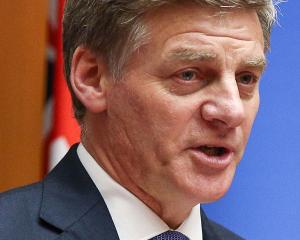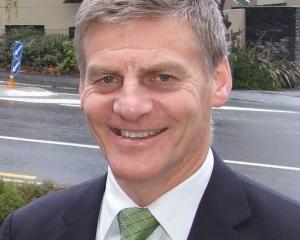Will the staunch critics of MMP finally be shown to have been right all along? Does their long-held assertion that the policy compromises flowing from a proportional voting system work against the long-term national interest have some basis after all?
Those questions hover in the ether after last year's referendum cemented MMP into the country's informal constitution for the foreseeable future. It has been a year in which politicians behaved like possums in the headlights of the passing parade of what was largely inconsequential political ephemera.
Short-term interest ruled, OK. So more is the pity that - with the single and commendable exception of the Greens' Russel Norman - politicians were conspicuous by their almost total absence from this week's Treasury-initiated conference on the ramifications of New Zealand's ageing population.
With National dragging the chain on future pension policy, the Treasury deserves credit for trying to kick-start in very non-partisan fashion what could be a long, but essential search for political consensus on how to cope with the ballooning costs of caring for the nation's elderly and thereby avoiding a nasty intergenerational conflict over who gets preferential access to ever-scarcer government resources.
The Victoria University-hosted conference was given two wake-up calls for the potential for such friction. First, the New Zealand University Students' Association issued a statement welcoming the symposium, noting the baby-boomers had done quite nicely for themselves but were leaving following generations a much less benign legacy in terms of a tertiary education no longer promising a high-skilled, high-paid job, but guaranteeing significant personal debt.
Second, Sir Michael Cullen told the conference the number of voters over the age of 65 could be as high as 40% by the year 2060. A political party focused on preserving the interests of the elderly would only need to capture a fifth of the votes of that group to become a power broker under MMP. This demographic shift is already under way.
Contrary to myth, the shift is permanent rather than being a temporary baby-boom blip. Statistics New Zealand estimates the number of people over the age of 65 will double from around 600,000 to up to 1.25 million by 2036 and up to 1.7 million by 2060. Over the same period, the number of people aged over 85 will jump from 76,000 to as many as 430,000.
In the 1970s, there were seven people of working age for every person in retirement. By 2060, the ratio will be four pensioners to nine younger adults. As a consequence, Treasury is projecting that on current settings the cost of state-funded superannuation will rise from 4.4% to 8% of gross domestic product by 2060.
Meanwhile, the public health bill will jump from nearly 7% to just over 11% of GDP, in part to fund costly new treatments plus health professionals as well as to pay for the increasing tide of the elderly flowing through hospital doors. The upshot is that government spending would mushroom from 34% to 47% of GDP largely to meet interest payments on a growing pile of debt from running continual deficits.
The Treasury believes things would not deteriorate to such degree because successive governments would seek to balance the annual Budget through cutting spending in other areas or increasing tax rates or introducing new taxes. One senior Treasury official assured the conference the numbers were no cause for panic. Girol Karacaoglu, a former bank economist, stressed there was no crisis. He agreed there were challenges ahead but insisted they were manageable.
However, Dr Karacaoglu's optimism was contingent on governments maintaining a strong and credible fiscal strategy over the short to medium terms to get debt levels down. Trade-offs would have to be made. The obvious question is: where?
The Treasury will produce packages containing potential policy options as part of the requirement under the Public Finance Act that by next October it produce a long-term fiscal statement looking forward for the next 40 years. However, it will not nominate a preferred package. That is very deliberate. The Treasury wants to simulate public debate - not stifle it by getting into a slanging match over cuts to some government programme or other.
This is an example of a fresh, more consultative approach adopted by the department's chief executive, Gabriel Mahklouf, which also sees Treasury's work on the long-term fiscal statement critiqued by an independent panel of experts at Victoria University's Business School. All up, the Treasury is trying to inject momentum into a still quiescent public debate. There will be some suspicion that the Treasury is also trying to bed in the parameters of the debate in order to cut back the role of the state in other areas.
However, in arguing that net debt is brought down to low levels and kept there, the Treasury might be merely being prudent given the likelihood of unforeseeable future ''shocks'' having a detrimental effect on the government's books. Nevertheless, given the Treasury's reluctance to increase taxes - a mindset described by Sir Michael as ''Tea Party silliness which belonged in the realms of creationism'' - an ever-sharper knife would have to be taken to spending. Ultimately, the politicians will have to make the decisions on revenue versus spending ratios.
What the Treasury does seem to have accepted is that the blitzkrieg-style approach to policy implementation of past eras will not work. The conference delivered two messages: first, that early implementation of the trade-offs required to meet additional pension and health costs is preferable to last-minute panic measures which might be more severe in their impact on the working population. Second, that the power that can be exercised by age cohorts under MMP makes it paramount that the search for consensus begins even earlier.
With its timely early flagging of its intention to raise the pension age to 67, Labour seems to have worked that out. The same cannot be said of National.
- John Armstrong is the political correspondent of The New Zealand Herald.




